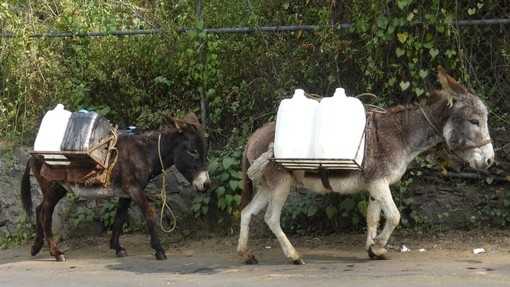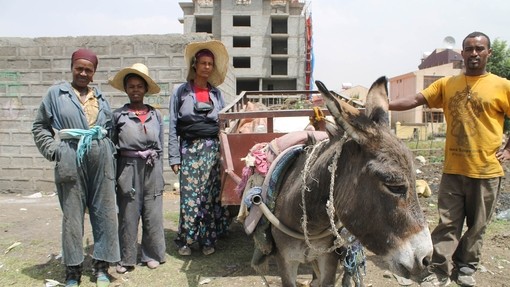
Our findings
Through the research projects we conduct, collaborate on and commission, we are constantly striving to reach and further improve the lives of donkeys and their hybrids (mules and hinnies) globally.
Increasing our knowledge base helps us to identify what constitutes a good quality of life and high welfare standards, giving us greater awareness and fuelling our mission to improve the lives of donkeys every day.
Our published body of work is where we can share our newly gained information with others around the world who are also working with donkey welfare in mind.
An overview of 2023
2023 brought its own challenges to our work, and that of our collaborators.
The world was still recovering from the impact of the global COVID-19 pandemic and adjusting to new ways of working. Communication and working practices embraced the online ways of working that had become widespread by necessity during the pandemic.
Increasing familiarity and access to online communication platforms, coupled with financial and environmental concerns meant that in many instances research practices shifted towards a more sustainable approach.
Collaborative working with partners situated in the location of interest became more common. The state of the global economy and the rising cost of living limited the availability of funding for research, and tightened the budgets where funding was available.
Yet despite these challenges, 2023 was a productive year for research at The Donkey Sanctuary and we are proud to share some of our key findings.

Our research in 2023
Research at The Donkey Sanctuary focuses solely on improving the health and welfare of donkeys and their hybrids worldwide. All our research is non-invasive and aims to inform us of ways we can improve the lives of donkeys and their hybrids.
Our research focus is broad and dynamic, and includes research focused on veterinary, welfare, socio-economic status of donkeys and their owners, the importance of donkeys and their hybrids to ecosystems and conservation, free-roaming donkeys, agriculture, production, dental health, harness and draught power, behaviour and wellbeing, physical health, physiology and morphology, and their value to communities in low and middle income countries.
Veterinary and dental research
Through our work in 2023, we have improved the way we understand veterinary therapeutics in donkeys and their hybrids, which supports quicker diagnosis and treatment where necessary.
Our donkey dental care research has also helped us to build our understanding of the relationships between dental health and management practices of donkeys in the UK.
Additionally, our work on the rare condition multisystemic eosinophiliotropic disease (MEED) has identified and raised important awareness of the clinical signs of this disease in donkeys to vets and animal health professionals.

Valuing donkeys and donkey status research
Our research around valuing donkeys has ranged from exploring patterns of representation and language use associated with donkeys to investigating the ways in which donkeys contribute to livelihoods in Northern Ghana and Central Ethiopia and the impact of donkey wellbeing on owners’ lives.
In Britain, we explored public discourse to help understand the contemporary status of donkeys. Our research revealed that donkeys are most commonly represented as figures of entertainment, ridicule, and as victims of hardship and suffering. These findings have important implications for animal welfare, education programs, and public communication about donkeys.
In Central Ethiopia, our findings revealed that working with donkeys can make the difference between destitution and modest survival, but societal perceptions of donkeys as low-status animals have an impact on their owners’ lives and donkey wellbeing.
While in Northern Ghana, our research showed the value of donkeys to farming households is substantial. Donkeys are now more important in people’s lives than had previously been recognised and are highly valued by their owners for their help in reducing drudgery and the multi-functional services they offer.

Working equid welfare research
Our international research has contributed valuable evidence to our portfolio, to help us advocate for better welfare for working equids around the world.
In research undertaken in the brick kilns of India, we investigated the welfare of donkeys owned under the conditions of debt-bondage, a form of slavery where people are forced to work for little or no money to pay off debt. We also examined the links between owner and donkey behaviour, and outline the living conditions of both donkeys and humans working in the brick kilns of Gujarat, India. Our work highlighted the need for policy reform within the brick-kiln industry to acknowledge the pivotal role of working donkeys in supporting human livelihoods.
In Nepal, we investigated the welfare status of mountain mules distributing supplies in the Gorkha region and identified key themes for improvement. Our findings highlighted a need for a multifaceted approach to improving donkey welfare where owners are collaborated with to improve the welfare of their own equids; in addition to industry professionals being encouraged to improve training and provision within veterinary services.
Our work on belief in animal sentience across four continents found a valuable link between owner attitudes and equid welfare. The results of our research showed that the general health and body condition of equids belonging to understanding owners and those owners who believed that their equids could feel emotions, were significantly better.

Looking forward in 2024
Our research work is designed to create impact and support positive change for donkeys and their hybrids around the world. In many cases, our research work adds to the portfolio of evidence needed to create law or policy change for donkeys and their hybrids.
It also helps inform care and management practices both for donkey populations globally and at our sanctuaries, allowing us to continually ensure that we are providing the best possible care to our resident animals.
Following 2023, we continue our research on a global level, working collaboratively so that we can increase the quality, reach and impact of our work, and ensure the outcomes create the most positive change for donkeys, hybrids and people.
Download our full 2023 research year in review
Share this page
Tags
- Research



